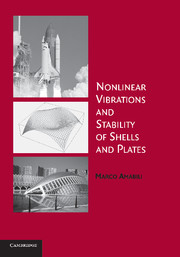Book contents
- Frontmatter
- Contents
- Preface
- Introduction
- 1 Nonlinear Theories of Elasticity of Plates and Shells
- 2 Nonlinear Theories of Doubly Curved Shells for Conventional and Advanced Materials
- 3 Introduction to Nonlinear Dynamics
- 4 Vibrations of Rectangular Plates
- 5 Vibrations of Empty and Fluid-Filled Circular Cylindrical Shells
- 6 Reduced-Order Models: Proper Orthogonal Decomposition and Nonlinear Normal Modes
- 7 Comparison of Different Shell Theories for Nonlinear Vibrations and Stability of Circular Cylindrical Shells
- 8 Effect of Boundary Conditions on Large-Amplitude Vibrations of Circular Cylindrical Shells
- 9 Vibrations of Circular Cylindrical Panels with Different Boundary Conditions
- 10 Nonlinear Vibrations and Stability of Doubly Curved Shallow-Shells: Isotropic and Laminated Materials
- 11 Meshless Discretizatization of Plates and Shells of Complex Shape by Using the R-Functions
- 12 Vibrations of Circular Plates and Rotating Disks
- 13 Nonlinear Stability of Circular Cylindrical Shells under Static and Dynamic Axial Loads
- 14 Nonlinear Stability and Vibration of Circular Shells Conveying Fluid
- 15 Nonlinear Supersonic Flutter of Circular Cylindrical Shells with Imperfections
- Index
- References
9 - Vibrations of Circular Cylindrical Panels with Different Boundary Conditions
Published online by Cambridge University Press: 08 January 2010
- Frontmatter
- Contents
- Preface
- Introduction
- 1 Nonlinear Theories of Elasticity of Plates and Shells
- 2 Nonlinear Theories of Doubly Curved Shells for Conventional and Advanced Materials
- 3 Introduction to Nonlinear Dynamics
- 4 Vibrations of Rectangular Plates
- 5 Vibrations of Empty and Fluid-Filled Circular Cylindrical Shells
- 6 Reduced-Order Models: Proper Orthogonal Decomposition and Nonlinear Normal Modes
- 7 Comparison of Different Shell Theories for Nonlinear Vibrations and Stability of Circular Cylindrical Shells
- 8 Effect of Boundary Conditions on Large-Amplitude Vibrations of Circular Cylindrical Shells
- 9 Vibrations of Circular Cylindrical Panels with Different Boundary Conditions
- 10 Nonlinear Vibrations and Stability of Doubly Curved Shallow-Shells: Isotropic and Laminated Materials
- 11 Meshless Discretizatization of Plates and Shells of Complex Shape by Using the R-Functions
- 12 Vibrations of Circular Plates and Rotating Disks
- 13 Nonlinear Stability of Circular Cylindrical Shells under Static and Dynamic Axial Loads
- 14 Nonlinear Stability and Vibration of Circular Shells Conveying Fluid
- 15 Nonlinear Supersonic Flutter of Circular Cylindrical Shells with Imperfections
- Index
- References
Summary
Introduction
This chapter addresses the linear (small amplitude) and nonlinear (large amplitude) vibrations of circular cylindrical panels. Simply and doubly curved panels are structural elements largely used in engineering applications, such as aeronautics, aerospace, cars, boats, buildings, trains and many others.
The linear vibrations of simply supported circular cylindrical panels are studied by using the Flügge-Lur'e-Byrne theory.
Nonlinear vibrations of circular cylindrical panels with different boundary conditions (including flexible rotational constraints) under radial harmonic excitations are studied by using Donnell's shell theory with in-plane inertia, as this gives practically the same results as for other refined classical theories for very thin isotropic shells (Amabili 2005). The solution is obtained by using the Lagrange equations of motion and up to 39 degrees of freedom (dofs). Numerical results show that a simply supported panel for mode (1,1) presents a significant softening nonlinearity, which turns to the hardening type for vibration amplitude larger than the shell thickness; a similar behavior is observed for the panel with fixed edges and free rotations; on the other hand, the same panel with free in-plane edges or clamped edges presents hardening nonlinearity.
A peculiar aspect of nonlinear vibrations of curved panels is the asymmetric oscillation with respect to the initial undeformed middle surface. In fact, the oscillation amplitude inward (i.e. in the direction of the center of curvature) is significantly larger than the amplitude outward.
Information
- Type
- Chapter
- Information
- Nonlinear Vibrations and Stability of Shells and Plates , pp. 242 - 271Publisher: Cambridge University PressPrint publication year: 2008
